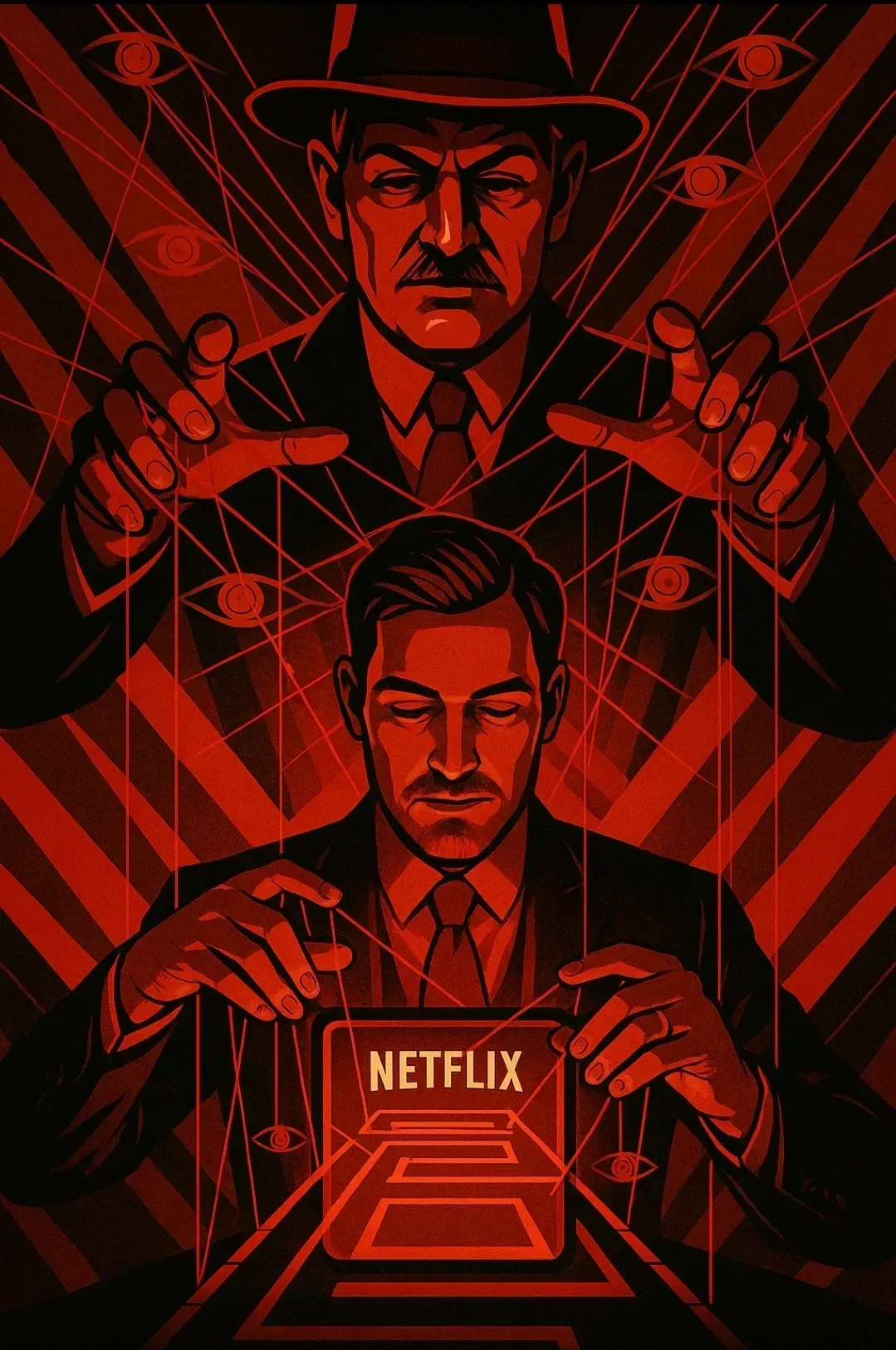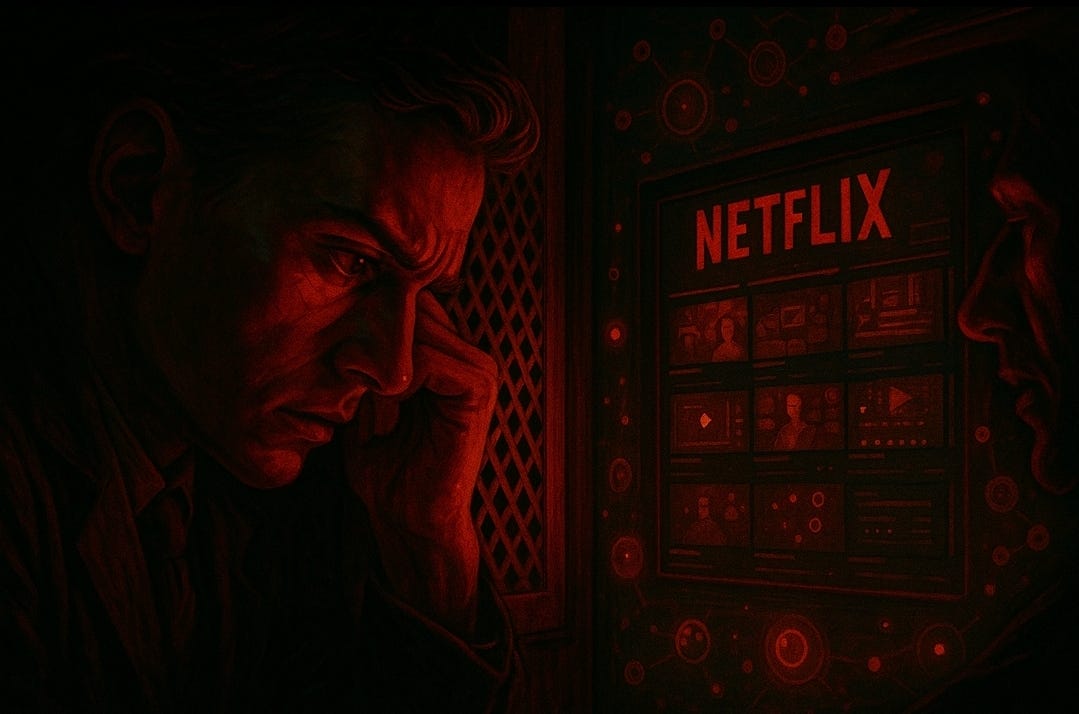
THE MANIPULATION MACHINE: NETFLIX’S FOUNDER WEAPONIZED MIND CONTROL PLAYBOOK
You think you chose that show last night? Think again.
Every time you fire up Netflix, you're stepping into the most sophisticated psychological manipulation chamber ever created for mass consumption. And it's no accident. Netflix co-founder Marc Randolph didn't just build a streaming platform-he constructed a digital extension of Edward Bernays' propaganda machine that would make the "Father of Public Relations" himself stand and applaud.
THE PROPAGANDA BLOODLINE YOU NEVER NOTICED

Let's get something straight: Edward Bernays-Sigmund Freud's nephew-wasn't just some advertising guy. He literally wrote the book called "Propaganda" in 1928, where he brazenly declared that "intelligent manipulation of the organized habits and opinions of the masses is an important element in democratic society."
Bernays believed the public needed to be guided by a "invisible government" of psychological manipulators. Sound familiar? That's precisely what Netflix has become under the architecture Randolph designed.
RANDOLPH’S ADMISSION: "I WAS A DIRECT MARKETING GUY"

Before Netflix, Randolph wasn't developing technology-he was perfecting manipulation. By his own confession: "Before I became a tech entrepreneur, I was a direct marketing guy. I mailed tens of millions of letters and catalogs each year."
This wasn't just business experience-it was psychological warfare training. Randolph learned how to measure, track, and modify human behavior through psychological triggers long before Netflix existed.

YOUR LIVING ROOM IS NOW A PSYCHOLOGICAL LABORATORY
When Randolph designed Netflix's interface, he didn't create it as a mere movie catalog. According to industry insiders, he specifically engineered it as "an online catalog of movies and a market research platform so that he could constantly test different versions to perfect the user experience."
Translation: Your screen is a one-way mirror, and you're the lab rat.
Every click, pause, rewind, and abandoned show feeds the machine. Netflix runs up to 250 A/B tests simultaneously, creating a psychological profile more detailed than anything Bernays could have imagined. The "choices" you think you're making? They've been systematically engineered through thousands of psychological experiments.
THE ILLUSION OF CHOICE: BERNAYS' SIGNATURE TECHNIQUE
Bernays' genius was making people think they were making independent decisions while actually responding to carefully crafted psychological triggers. His infamous "Torches of Freedom" campaign didn't sell cigarettes-it sold "liberation" to women in the 1920s.
Netflix has perfected this illusion. Reed Hastings, Netflix's co-founder, revealed the playbook: "If the Starbucks secret is a smile when you get your latte, [Netflix's secret] is that the Web site adapts to the individual's taste."
But here's the uncomfortable truth: It's not adapting to your taste-it's shaping it. When Netflix's algorithm presents "personalized" recommendations, it's not serving you; it's steering you toward content that serves Netflix's engagement metrics and business goals.
THE ADDICTION ARCHITECTURE
Bernays understood that manipulation required both removing pain and engineering pleasure. Netflix's subscription model-created under Randolph's leadership-eliminated the "pain points" of late fees and due dates while engineering continuous psychological rewards through the binge-watching model.
The infamous "Queue" feature Randolph developed wasn't a convenience-it was a commitment device ensuring psychological investment in the platform. Once you've filled your queue, you've essentially made a dozen micro-commitments to the service, dramatically increasing retention probability.
THEY’RE COMPETING FOR YOUR CONSCIOUSNESS
Perhaps most revealing is Netflix's internal perspective on competition. They don't see other streaming services as their main rivals-they view sleep as the enemy. Former CEO Reed Hastings admitted it plainly: "We're competing with sleep."
Let that sink in. A company explicitly states its goal is to keep you from a biological necessity. Bernays could only dream of such ambition-manipulating people to the point of sacrificing basic human needs.
THE UNCOMFORTABLE REALITY
Here's what makes this so insidious: It works. And we love it. The average American now spends over three hours daily watching streaming content. That's 45 days per year-more time than most spend with their closest friends or family members.
Netflix isn't just entertainment; it's engineered dependency. Randolph and his team built a system that applies Bernays' psychological manipulation techniques at a scale and precision that would have been unimaginable to Bernays himself.
Every recommendation, every auto-playing episode, every "trending now" selection is calculated to keep you consuming. Not because it's what you genuinely want, but because it's what keeps you psychologically tethered to the platform.
THE CHOICE IS YOURS...OR IS IT?
Next time your Netflix home screen populates with "recommendations just for you," remember: you're not making choices-you're responding to them. The psychological manipulation techniques pioneered by Bernays and industrialized by Randolph have created a system where you feel in control while being subtly guided.
The most powerful form of control, as Bernays knew, is the kind that makes you feel like you're in charge while systematically influencing your behavior. Netflix hasn't just built a streaming service; they've constructed the most sophisticated psychological manipulation platform in human history.
And the truly uncomfortable part? Even knowing all this, you'll probably still watch tonight.
Share this article if you dare. The recommendation algorithm probably won’t like it.